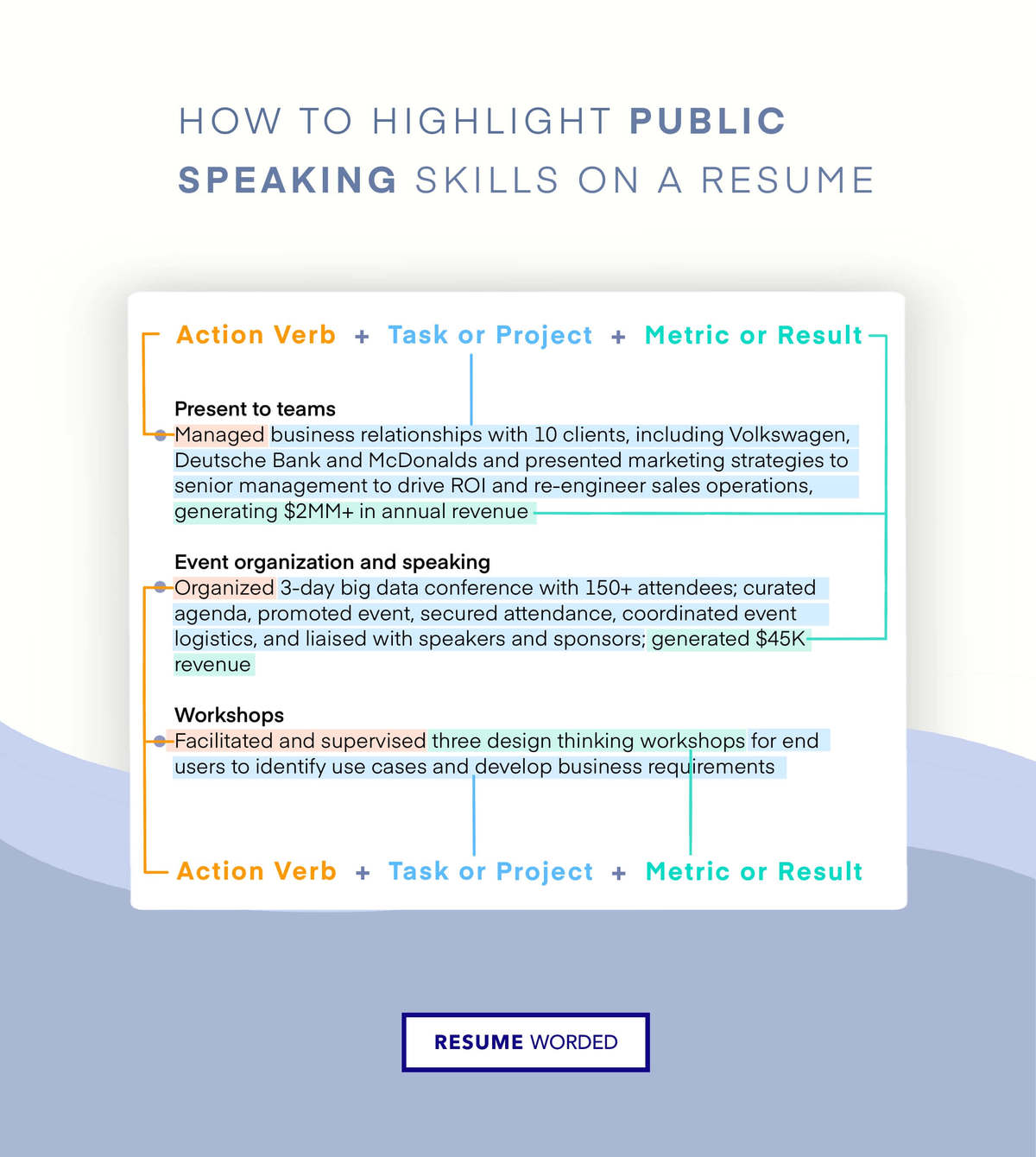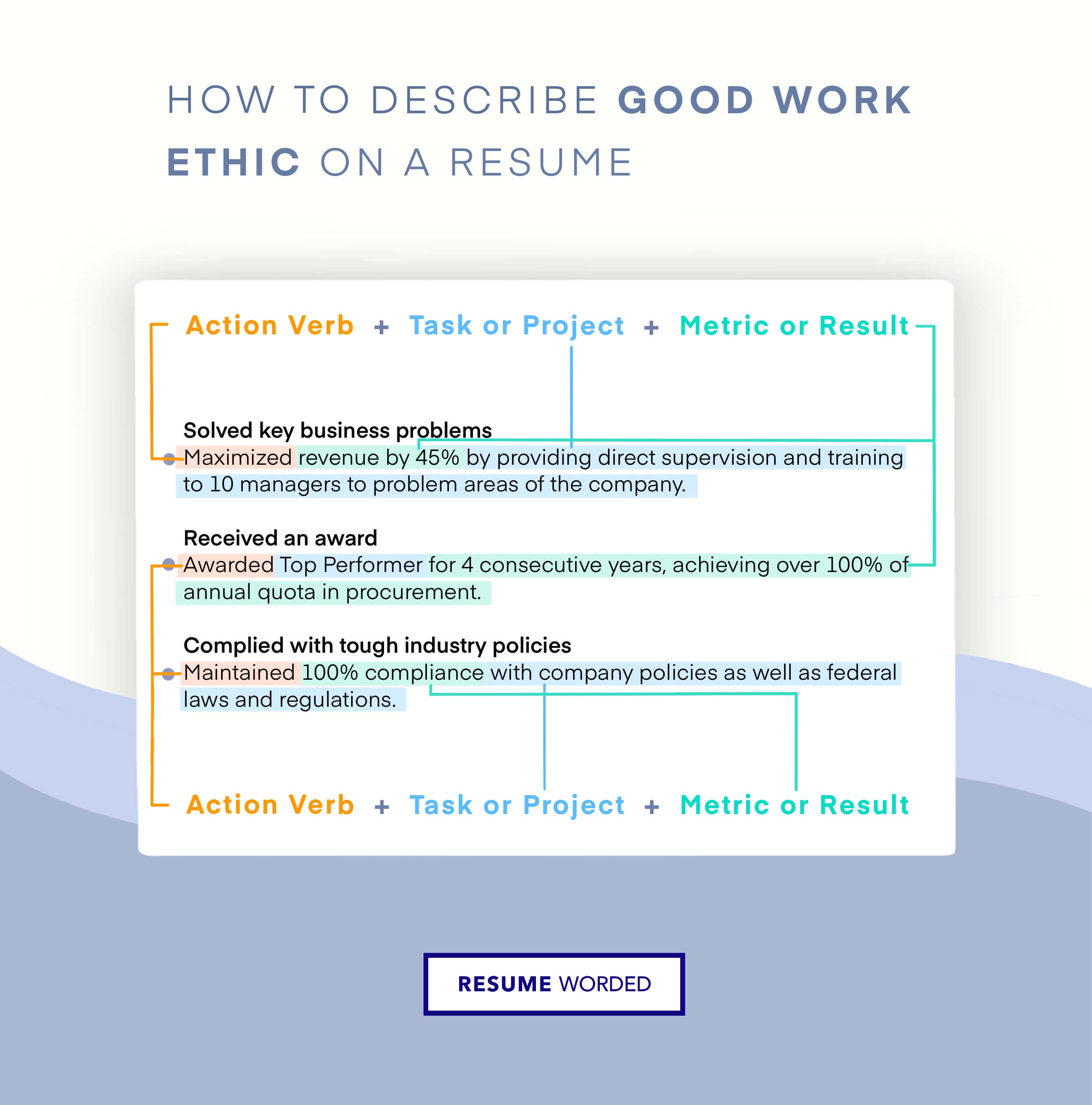Whether you’re a professional speaker or just need to present at the occasional conference, public speaking is a valuable — and rare — skill to have. It’s also a soft skill, which makes it a little tricky to list on a resume. Unlike hard skills, you can’t just add “public speaking” to your skills section and be done with it. So, what can you do instead?
The answer is to demonstrate public speaking skills through your resume accomplishments. While hiring managers hate reading buzzwords like “excellent communicator” or “strong motivator,” they love concise, action-focused bullet points that show how you’ve actually used those skills.
Ready to begin? Here’s a quick-start guide on how to add public speaking skills to your resume.
How to write a resume for a public speaker
- Determine how much public speaking is required by the job. A resume for a full-time public speaker is going to look very different from one where it’s an occasional duty.
- Search the job description for specific public speaking skills you’ll need in the job.
- Brainstorm examples of when you’ve used similar skills in a professional context. Try to come up with one example for each job duty listed.
- Write these examples down in bullet point format, starting with a strong action verb.
- Finish with a metric that describes the results of your actions.
- Get feedback on your resume from an ATS resume scanner to identify any missing skills or keywords.
How to say you’re good at public speaking
Like any other soft skill, the best way to include public speaking skills on your resume is in the work experience section. If possible, choose examples of accomplishments that closely match the duties listed in the job posting — for example, if you’ll be presenting in front of large groups, try to come up with at least one time when you’ve presented in front of a group. If you’ll be speaking with a particular aim in mind — like sales, education, or mediation — include skills related to that specific purpose.
If you’re changing careers or just starting out, you can use your bullet points to highlight transferable skills instead. These can include other types of experience instead of purely work experience — Were you a member of your college debate team? Hosted a large function for a local sports team or community group? Participated in a stand-up comedy event? Those can all be used to demonstrate public speaking skills as part of an ‘Activities’ or ‘Community Involvement’ section.
Find out if your resume shows public speaking skills
A good way to find out if your resume highlights your public speaking skills is to upload it to the tool below — it’ll scan your resume and let you know if you have shown soft skills such as public speaking, working well under pressure, multitasking and teamwork the right way.
Action verbs for public speaker resumes
Resume accomplishments need to stay focused on what you did, which means that every good bullet point should start with an action verb. Try starting your public speaking accomplishments with action verbs like:
- Presented
- Motivated
- Lectured
- Trained
- Addressed
- Interviewed
- Coached
- Advised
- Influenced
- Moderated
- Performed
- Taught
- Co-ordinated
Jobs for people who are good public speakers
If you’re good at public speaking, why not consider some of these potential careers:
- Motivational speaker
- Training specialist
- Tour guide
- Sales representative
- Mediator
- Spokesperson
- Radio host
- TV presenter
- Actor
- Comedian
- News reporter
- Educator
- Politician
- Lawyer
- Speech writer
- Speaking trainer
Interested in pursuing a public speaking career but not sure how to start writing your resume? Here are some of the essential public speaking skills you’ll need for these jobs.
If you’re not sure which skills to include in your skills section, use the tool below to search for the public speaking job you’re applying for and it’ll give you a list of relevant skills. For example, type News Reporter to get a list of skills News Reporters are expected to have.
Public speaking skills to highlight on a resume
Public speaking doesn’t exist in a vacuum — you’ll also need related skills like:
- Interpersonal skills
- Communication
- Leadership
- Negotiation
- Active listening
- Speech writing
- Creativity
- Organization
- Problem solving
- Decision making
- Good memory
- Sales acumen
- Instructional abilities
- Subject matter knowledge
- Confidence
Bear in mind, these are all soft skills that shouldn’t be listed directly on your resume. Instead, highlight them through your resume bullet points.
Need some tips? Here are a few examples to get you started.
Public speaking resume examples
Here are some examples of public speaking resume accomplishments to provide some inspiration for writing your own bullet points.
Organized a variety of different events, including sales events, showcases, and free seminars with attendees averaging from 150-200, gaining over $70,000 in direct sales.
If you’ll be involved in public speaking events, your accomplishments should also highlight skills like organization, communication, and event planning.
Coordinated and planned 10+ training sessions for 50+ workers across 2 main offices; set agenda and produced minutes for C-suite executives.
If you’ll be delivering training, workshops, or professional development, choose an accomplishment that demonstrates your ability to train and lead others.
Managed business relationships with 10 clients, including Volkswagen, Deutsche Bank and McDonalds and presented marketing strategies to senior management to drive ROI and re-engineer sales operations, generating $2MM+ in annual revenue.
Sales and public speaking often go hand in hand. If you’ll be speaking to external clients or stakeholders, emphasize metrics like business growth and revenue generation.
Produced 185 radio news stories for on-air morning and afternoon programs and hosted a Resume Worded afternoon radio show conducting over 495 hours of live on-air radio time and 257 hours of on-air interviews.
If you’re applying for a job well within the public sphere, like journalism or entertainment, include bullet point examples of previous experience presenting live or to a large audience.










